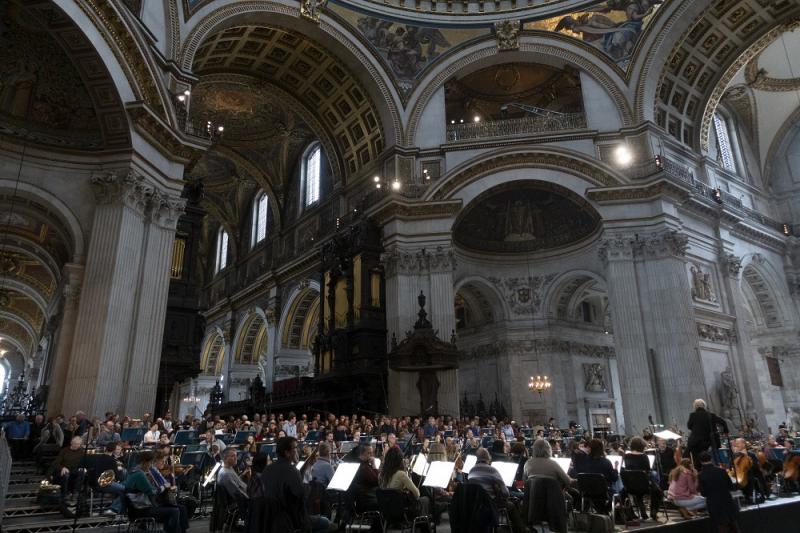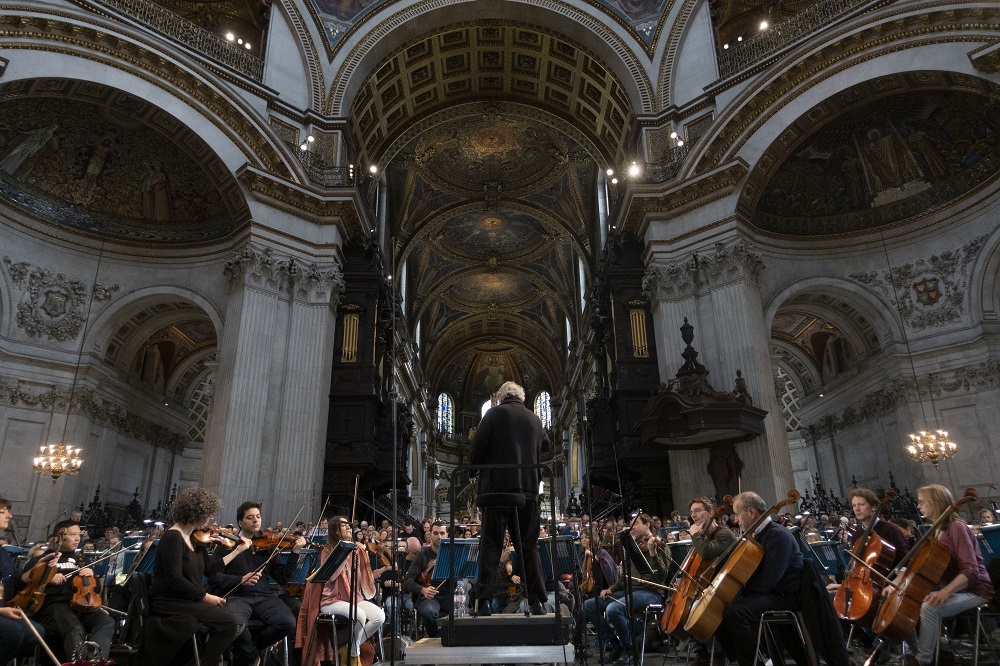Berlioz Requiem, Spyres, Philharmonia Orchestra, Nelson, St Paul's Cathedral review - masses and voids | reviews, news & interviews
Berlioz Requiem, Spyres, Philharmonia Orchestra, Nelson, St Paul's Cathedral review - masses and voids
Berlioz Requiem, Spyres, Philharmonia Orchestra, Nelson, St Paul's Cathedral review - masses and voids
Shock and awe on the 150th anniversary of the composer's death

Asked to choose five or ten minutes of favourite Berlioz on the 150th anniversary of his death (yesterday), surely few would select anything from his giant Requiem (Grande Messe des Morts). This is a work to shock and awe, not to be loved - music for a state funeral given a metaphysical dimension by the composer's hallmark extremes in original scoring.
It depends on where you sit, but even in the very front row of the seating under the dome, what in continental terms would be seen as a VIP seat but made available because the three unreserved press rows were already full, I can't claim to have had the ideal experience. Illuminating, certainly, to hear how Berlioz writes for cellos and especially double basses; but the massed choirs, though they still made such a splendid noise, especially in full throttle unisons, that one wondered if a few professionals had been lodged within them, sounded a good deal further away than they actually were. It certainly wasn't the fault of them or their chorus masters, Gavin Carr and Neville Creed - Nelson is also a renowned chorus trainer - if hardly any consonants emerged. Worst casualty, from my perspective, was the judgment-day juggernaut of the Lacrimosa, all string ricochets and roars, but very little of the vital melodic line coming through.
It certainly wasn't the fault of them or their chorus masters, Gavin Carr and Neville Creed - Nelson is also a renowned chorus trainer - if hardly any consonants emerged. Worst casualty, from my perspective, was the judgment-day juggernaut of the Lacrimosa, all string ricochets and roars, but very little of the vital melodic line coming through.
The foundations duly shook with the soundings of the four brass bands, placed at the pillars to the two transepts; judgment day indeed. What worked best were the moments of dynamic or orchestral restraint: unearthly chords of wind and brass, above all the heaven of the flutes above the hell of the trombones, the chromatic descents of the Kyrie fading to black, string elaborations around the ghostly choral keenings on Berlioz's favourite interval (minor sixth to fifth).  Nelson couldn't hope to interpret much under these circumstances, and maybe Berlioz's approach to the mass doesn't allow that; a firm beat and proper cues from a manager of huge forces were required, and duly provided. Acoustically and emotionally the high spot of the evening - and how high it is for the tenor - was the angelic trumpeting of Michael Spyres (pictured above by Marco Borrelli) in the Sanctus; singing like this would make it one slice of Berlioz to take to one's desert island, after all, if it weren't for the relatively earthbound choral "Hosannas"s.
Nelson couldn't hope to interpret much under these circumstances, and maybe Berlioz's approach to the mass doesn't allow that; a firm beat and proper cues from a manager of huge forces were required, and duly provided. Acoustically and emotionally the high spot of the evening - and how high it is for the tenor - was the angelic trumpeting of Michael Spyres (pictured above by Marco Borrelli) in the Sanctus; singing like this would make it one slice of Berlioz to take to one's desert island, after all, if it weren't for the relatively earthbound choral "Hosannas"s.
It's not in any way Spyres's fault if he got a longer programme biography than the note for the music; Latin/English texts most of us could do without, but unforgivable not to list the players and choral members. This, of all solemn events, was not the right place for a glossy, flimsy souvenir brochure. Hoping for better this summer from the BBC Proms, which must surely be giving us the Mass in the place where it works best, the Royal Albert Hall. No idea what the overall programme is yet - details in April - but the biggest and most original, if not the very best, of Berlioz has to be among the anniversary tributes.
rating
Share this article
Add comment
The future of Arts Journalism
You can stop theartsdesk.com closing!
We urgently need financing to survive. Our fundraising drive has thus far raised £49,000 but we need to reach £100,000 or we will be forced to close. Please contribute here: https://gofund.me/c3f6033d
And if you can forward this information to anyone who might assist, we’d be grateful.

Subscribe to theartsdesk.com
Thank you for continuing to read our work on theartsdesk.com. For unlimited access to every article in its entirety, including our archive of more than 15,000 pieces, we're asking for £5 per month or £40 per year. We feel it's a very good deal, and hope you do too.
To take a subscription now simply click here.
And if you're looking for that extra gift for a friend or family member, why not treat them to a theartsdesk.com gift subscription?
more Classical music
 Scott, Irish Baroque Orchestra, Whelan, RIAM, Dublin review - towards a Mozart masterpiece
Characteristic joy and enlightenment from this team, but a valveless horn brings problems
Scott, Irish Baroque Orchestra, Whelan, RIAM, Dublin review - towards a Mozart masterpiece
Characteristic joy and enlightenment from this team, but a valveless horn brings problems
 Classical CDs: Voice flutes, flugelhorns and froth
Baroque sonatas, English orchestral music and an emotionally-charged vocal recital
Classical CDs: Voice flutes, flugelhorns and froth
Baroque sonatas, English orchestral music and an emotionally-charged vocal recital
 Kanneh-Mason, Britten Sinfonia, Shave, Milton Court - a grin and a big beaming smile
A pair of striking contemporary pieces alongside two old favourites
Kanneh-Mason, Britten Sinfonia, Shave, Milton Court - a grin and a big beaming smile
A pair of striking contemporary pieces alongside two old favourites
 theartsdesk at the New Ross Piano Festival - Finghin Collins’ musical rainbow
From revelatory Bach played with astounding maturity by a 22 year old to four-hand jazz
theartsdesk at the New Ross Piano Festival - Finghin Collins’ musical rainbow
From revelatory Bach played with astounding maturity by a 22 year old to four-hand jazz
 First Person: Manchester Camerata's Head of Artistic Planning Clara Marshall Cawley on questioning the status quo
Five days of free events with all sorts of audiences around Manchester starts tomorrow
First Person: Manchester Camerata's Head of Artistic Planning Clara Marshall Cawley on questioning the status quo
Five days of free events with all sorts of audiences around Manchester starts tomorrow
 Goldscheider, Brother Tree Sound, Kings Place review - music of hope from a young composer
Unusual combination of horn, strings and electronics makes for some intriguing listening
Goldscheider, Brother Tree Sound, Kings Place review - music of hope from a young composer
Unusual combination of horn, strings and electronics makes for some intriguing listening
 theartsdesk Q&A: composer Donghoon Shin on his new concerto for pianist Seong-Jin Cho
Classical music makes its debut at London's K-Music Festival
theartsdesk Q&A: composer Donghoon Shin on his new concerto for pianist Seong-Jin Cho
Classical music makes its debut at London's K-Music Festival
 Helleur-Simcock, Hallé, Wong, Bridgewater Hall, Manchester review - moving lyricism in Elgar’s concerto
Season opener brings lyrical beauty, crisp confidence and a proper Romantic wallow
Helleur-Simcock, Hallé, Wong, Bridgewater Hall, Manchester review - moving lyricism in Elgar’s concerto
Season opener brings lyrical beauty, crisp confidence and a proper Romantic wallow
 Kohout, Spence, Braun, Manchester Camerata, Huth, RNCM, Manchester review - joy, insight, imagination and unanimity
Celebration of the past with stars of the future at the Royal Northern College
Kohout, Spence, Braun, Manchester Camerata, Huth, RNCM, Manchester review - joy, insight, imagination and unanimity
Celebration of the past with stars of the future at the Royal Northern College
 Jansen, LSO, Pappano, Barbican review - profound and bracing emotional workouts
Great soloist, conductor and orchestra take Britten and Shostakovich to the edge
Jansen, LSO, Pappano, Barbican review - profound and bracing emotional workouts
Great soloist, conductor and orchestra take Britten and Shostakovich to the edge

Comments
A mealy mouthed assessment, I
The point was to qualify my
The point was to qualify my experience of the performance, given the notorious acoustical problems of St Paul's. Don't think I didn't give a generous response to the performers. I do think part of the ovation was to celebrate the nature of the occasion, though.
Do so agree about the tatty
Thank you Mr Nice for your